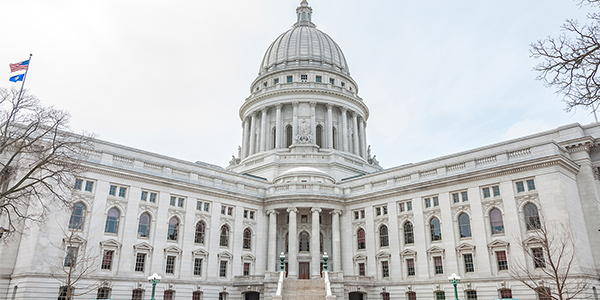Wisconsin Gov. Tony Evers’ (D) second state budget seeks millions in funding to make good on the commitment he made a year ago to address climate change. However, the policy measures he proposed to put the state on a path to 100% carbon-free electricity by 2050 will likely meet the same fate as his 2019 climate agenda, which was cut out of the budget by the Republican-controlled legislature.
Evers joined the U.S. Climate Alliance of governors pledging to support the carbon reduction goals of the Paris climate accord shortly after taking office in 2019. He narrowly defeated Republican Gov. Scott Walker, ending an eight-year administration which rarely mentioned “climate change” except to deny its existence.
“We made a commitment to make Wisconsin 100% carbon-free by 2050, and we’re going to keep it,” Evers said in his budget address Feb. 16. “Our utility partners have made great strides this year toward reducing emissions, but we still have a long way to go. … It is critical that we take necessary and immediate steps to address energy production and efficiency.”
The commitment to a carbon-free future was stripped from the governor’s proposed 2019-2021 state budget by the Republican leadership of the Joint Finance Committee. Also nixed was the creation of an Office of Sustainability and Clean Energy within the Department of Administration.
And Evers’ chances don’t look much better this year. Republican Assembly Speaker Robin Vos dismissed his climate agenda and other budget proposals as “nothing more than a liberal Democrat from Madison’s wish list to his donors.” The budget must be approved by July 1.
Evers has attempted to advance his agenda through executive actions, such as an Oct. 2019 executive order creating the Governor’s Task Force on Climate Change.
After a series of public meetings, the 32-member task force, chaired by Lt. Gov. Mandela Barnes, issued a 120-page report in December offering 55 recommendations related to energy, transportation, agriculture, education, forestry, food, jobs and environmental justice.
All but 10 of the proposals would require legislative approval or inclusion in the state budget.
“We’re excited about Gov. Evers’ budget proposal. It has a lot of really ambitious agenda items that reflect what people have been asking for,” said Heather Allen, executive director of RENEW Wisconsin, a nonprofit promoter of renewable energy. “There are areas of compromise that recognize the economic benefits of renewable energy for the state.”
Allen said there is support across the aisle for some aspects of the governor’s climate change agenda — such as funding for job training in the fields of renewable energy and energy efficiency through the Wisconsin Fast Forward grant program.
“We need to increase the number of Wisconsinites trained in those jobs,” she said. “We’re optimistic there’s bipartisan support for this.”
Allen is also hopeful Evers will win support for his proposal to double utility companies’ funding of the Focus on Energy program, which has been frozen since 2010. Doubling the funding from 1.2% to 2.4% of annual operating revenues would generate an additional $100 million for energy programs for low-income residents and investments in renewable energy.
“This program is actually where Wisconsin is a leader. Focus on Energy has proven very effective in funding energy efficiency and renewables,” Allen said. “We would love to see deeper investment there and an expansion of the program into new areas like electric vehicles and beneficial electrification. These are definitely things we think both parties can get behind.”
One recommendation not requiring legislative approval is having the state lead by example: committing agencies and buildings to switch to clean energy use. The University of Wisconsin-Platteville, for instance, won approval in early February to build a 2.4-MW solar array. The infrastructure could save the campus $200,000 annually after it is built later this year.
“More and more projects like that coming online through the governor’s leadership will demonstrate the value of renewable projects for the state just from the bottom-line perspective,” Allen said.
The governor also doesn’t need the legislature to endorse the carbon-reduction goals of the state’s utility companies. Alliant Energy, WEC Energy Group and Xcel Energy have all made public their significant plans to shift away from coal and gas for generating electricity over the next couple decades. Alliant is investing $900 million in clean energy production, including the purchase of several solar farms.
Another move Evers could make unilaterally is to compel the Public Service Commission to modernize and standardize the rates paid to customers who generate renewable energy — everyone from homeowners with rooftop solar panels to manufacturers and institutions which can independently produce several megawatts of clean energy. Many renewable energy generators are competitively disadvantaged by the current system that allows individual utilities to set rates that should be uniform across the state, RENEW says.
Evers’ budget includes the task force’s call for funding of a statewide climate risk assessment and resilience plan and technical assistance for municipalities and tribal communities to plan to be carbon-free by 2050. Evers would also fund a new Office of Environmental Justice with $200,000 over its first two years.
The governor’s wish list includes $100 million in bonds for energy conservation projects on state property, such as the University of Wisconsin System; $30 million spent on flood prevention measures and infrastructure; $10 million from the state’s portion of the Volkswagen emissions settlement to reinstate an electric vehicle charging station grant program; and $700,000 to replace aging state vehicles with electric ones.
“The climate crisis is taking an undeniable toll on folks across our state,” Evers said in his budget address. “Every Wisconsinite — whether they live in the Driftless, the Central Sands, or the Northwoods, or in the heart of our urban areas — has experienced the effects of climate change. And communities of color, low-income Wisconsinites, and our farmers have been among those most disproportionately affected.”





